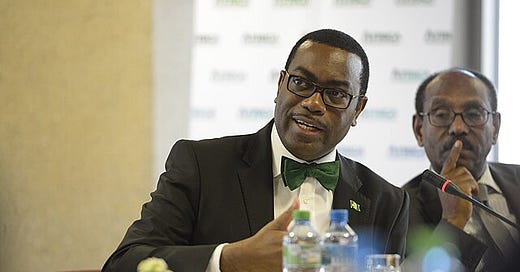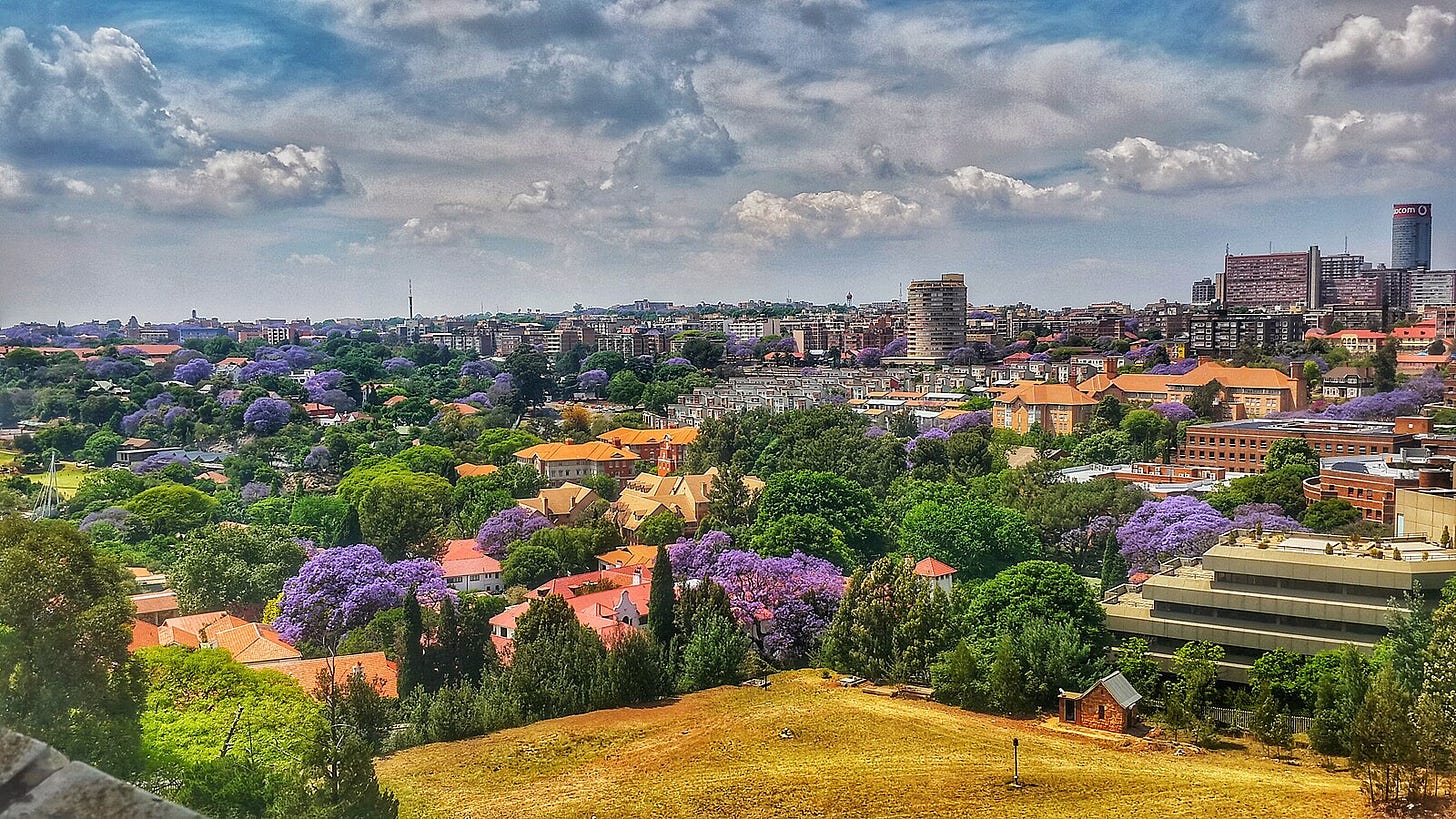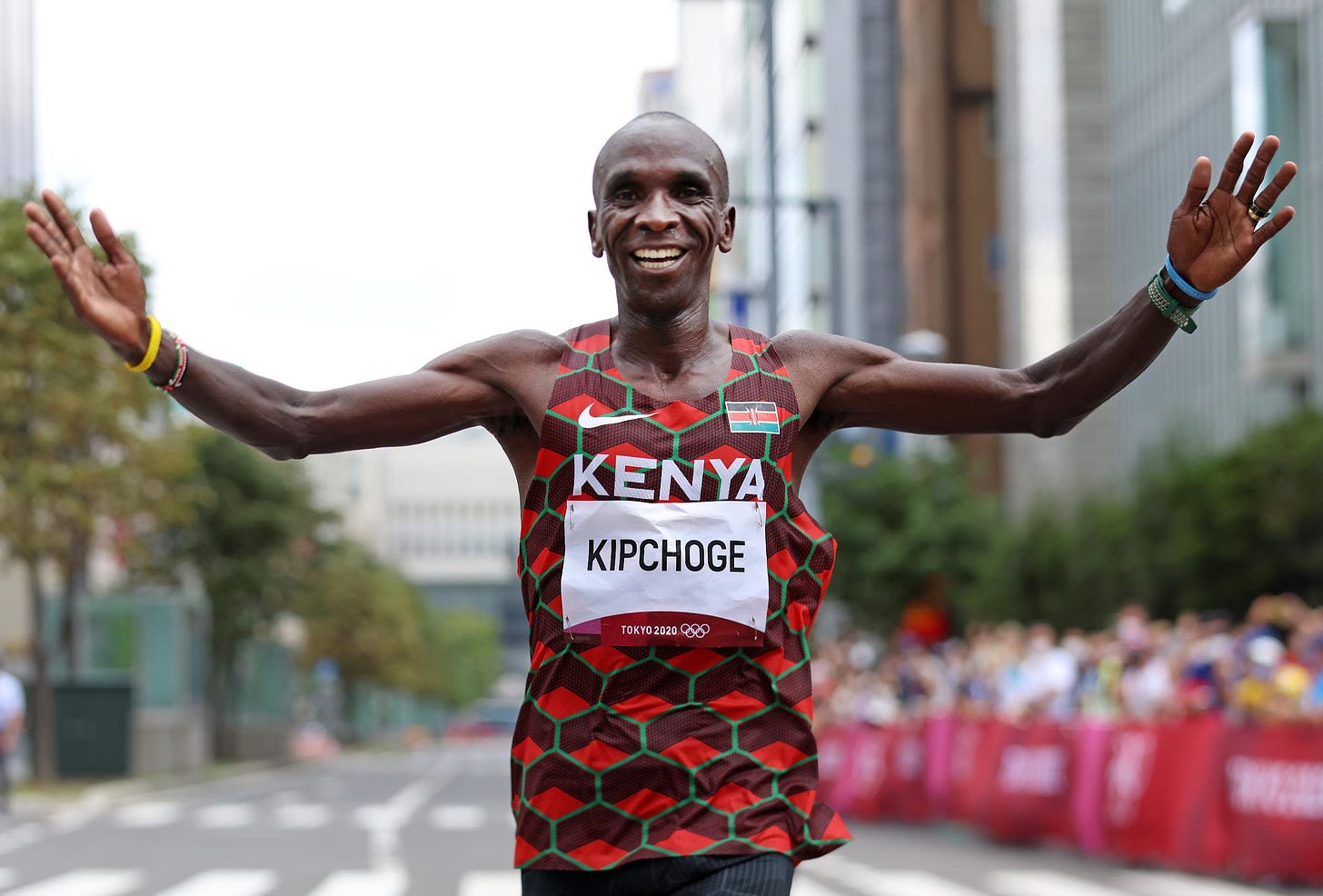🔅 Africa's Optimist-in-Chief and Head of AfDB Speaks Up, Kenyans Take Back Their Doctors
Plus, What Does The Diet of A Marathon World Record-Holder Look Like? & A Family Story of Congo's Fight for Independence
Photo of the day
Johannesburg, South Africa
Markets:
🟢 Nigerian SE: 67,200.69 (+31.12%)
🔴 Johannesburg SE: 72,919.72 (-0.18%)
🟢 Ghana SE: 3,145.33 (+28.70)
🔴 Nairobi SE: 93.37 (-26.75%)
🟢 US S&P 500: 4,327.78 (+13.17%)
🔴 Shanghai Composite: 3,088.10 (-0.91%)
*Data accurate as of the close of markets across the continent
Brief & Bright: Africa's Top Five
AfDB's Adesina: Africa's Optimist-In-Chief
According to the president of the African Development Bank (AfDB), Akinwumi Adesina, Africa is the future workforce for ageing economies in the west. He also believes it's time to ditch the stereotypes about corruption and risk in the continent. With a growing middle class, vast investment opportunities, and a youthful population, he says the future looks bright for Africa. Plus, with 60% of the world's solar power and 65% of arable land left uncultivated, there's plenty of potential for growth in renewable energy and agriculture. And let's not forget about Africans' role in mobile money services and the global fintech industry. But you can trust the data, not just his optimism: just as an example, Africa's default rate on infrastructure investments is the lowest in the world.
"Colette and Justin": A Family Story of Congo's Fight for Independence
This isn't your average family history documentary. In "Colette and Justin," filmmaker Alain Kassanda dives into the tangled and pivotal era of Congo's fight for independence in 1960—using his grandparents, Colette and Justin, as the central figures. The film combines interviews, archival footage, and Kassanda's own commentary on colonization and family dynamics. As they watch clips from colonial propaganda films, Colette and Justin reveal details such as scenes staged by the Belgian government of Congolese 'savages', exposing the colonialists' manipulation and division tactics. When Congo finally gained independence, Justin joined the government and even participated in a secession movement, leaving Kassanda to grapple with his feelings towards his grandfather. This documentary is a powerful and personal look at the lasting effects of colonization and the fight for healing and unity.
The Cost of Debt: How Poor Countries are Facing Billions in Budget Cuts
Being in debt is tough but even more challenging when you’re one of the world’s poorest countries. Oxfam’s latest report reveals that many African nations face budget cuts of over $220 billion in the next five years, with daily interest and debt repayments totalling nearly half a billion dollars. This is all thanks to rising global interest rates and economic shocks from the pandemic. And while the IMF and World Bank are focusing on debt restructuring and spending cuts, Oxfam is calling for a fairer system and suggesting taxing the rich instead. But let’s be honest; we all know how that will go. The report also points out that these countries spend four times more on debt servicing than healthcare. That said, some progress is being made with debt reworks for defaulted nations like Zambia and Ghana at this week's IMF meeting in Marrakech.
Kenya Cuts Ties with Cuban Doctors: Time to Take Care of Our Own

Kenya’s government has decided to end a deal that brought Cuban doctors to work in Kenya while sending Kenyan doctors to Cuba for specialized training. Not only was the program unpopular with Kenya’s main doctors union, who were jealous of the Cuban doctors’ higher salaries, but critics argued that the money could be better spent on improving Kenya’s medical infrastructure and supporting local doctors. The Kenyan Health Minister announced the end of the deal to a cheering crowd, and promised to take better care of the country’s own health workers. Under the agreement signed in 2017, 50 Kenyans were sent to Cuba for training, while 100 Cubans came to work in Kenyan hospitals. However, the high salaries of the Cuban doctors caused quite a stir, with local doctors demanding equal pay and better working conditions.
Thinking of Getting Uber Fit? Take a Cue from a Marathon World Record-Holder
You might think that being a world-class marathoner requires a complicated, expensive diet—but according to Eliud Kipchoge, the secret is simplicity. The Kenyan runner, who just won his fifth Berlin Marathon, sticks to a balanced mix of protein and carbs, with his favourite being the Kenyan staple ugali (a meal made from maize/corn). For breakfast, he opts for white tea, bread, and fruit, and on race day, he keeps it light with cereals or oats. And let's not forget about hydration—Kipchoge aims for three litres of water a day. His nutritionist emphasizes the importance of the right carbs, like rice, pasta, and bananas, to fuel his training. But the key takeaway? Keep it simple and focus on whole foods. You don't need a fancy diet to be a top athlete.
Food for Thought
"Wisdom is like a baobab tree; no one individual can embrace it."
— Akan Proverb







